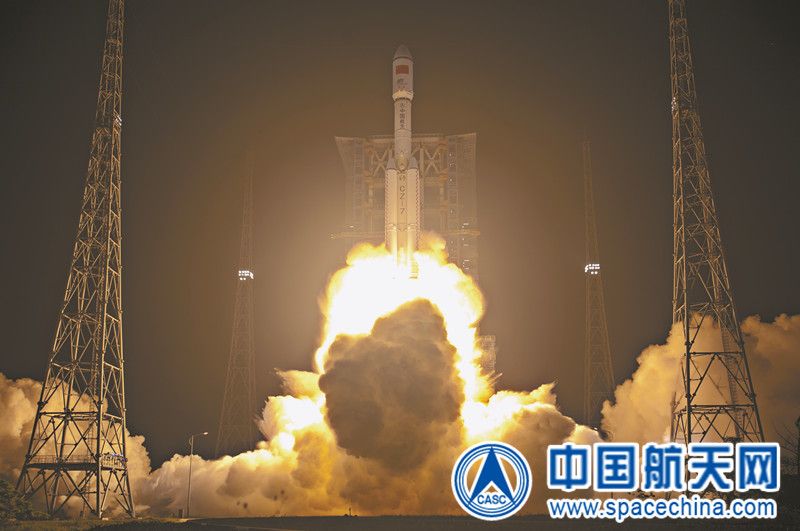News Center
China launches first cargo spacecraft Tianzhou-1
April 24, 2017
Source: Xinhua| 2017-04-20 20:12:19|Editor: An

China's first cargo spacecraft Tianzhou-1 blasts off from Wenchang Space Launch Center in south China's Hainan province, April 20, 2017. (Xinhua/Ju Zhenhua)
WENCHANG, Hainan, April 20 (Xinhua) -- China on Thursday launched its first cargo spacecraft, Tianzhou-1, into space, a crucial step for the country in building a space station by approximately 2022.
Lifted by a Long March-7 Y2 carrier rocket, Tianzhou-1 roared into the air from the Wenchang Space Launch Center in south China's Hainan Province Thursday evening.
In space, the cargo ship will dock with the orbiting Tiangong-2 space lab, provide fuel and other supplies, and conduct space experiments before falling back to Earth.
China aims to build a permanent space station that is expected to orbit for at least 10 years, and the debut of the cargo ship is important as it acts as a courier to help maintain the space station.
Without a cargo transportation system, the station would run out of power and basic necessities, causing it to return to Earth before the designated time.
If the Tianzhou-1 mission is successful, China will become the third country besides Russia and the United States to master the technique of refueling in space.
"The Tianzhou-1 mission includes the breakthrough of in-orbit refueling and other key technologies needed to build a space station, laying a foundation for future space station operations," said Bai Mingsheng, chief designer of the cargo ship.
The cargo ship is 10.6 meters long and has a maximum diameter of 3.35 meters. Its maximum takeoff weight is 13.5 tonnes, enabling it to carry over 6 tonnes of supplies.
Tianzhou-1 is larger and heavier than Tiangong-2, which is 10.4 meters in length and has a maximum diameter of 3.35 meters, weighing 8.6 tonnes.
Bai said that supplies loaded on the cargo spacecraft are nearly as heavy as the ship's own weight, exceeding the loading capacity of Russian cargo ships in active service.
Tianzhou-1 will dock with Tiangong-2 three times, said Bai. After the first docking, aerospace engineers will test the controlling ability of the cargo spacecraft over the two spacecraft.
The second docking will be conducted from a different direction, which aims to test the ability of the cargo ship to dock with the space station from different directions.
In the last docking, Tianzhou-1 will use fast-docking technology. Previously, it took China about two days to dock, while fast docking will take about six hours, according to Bai.
Refueling is conducted during docking, a process that is much more complicated than refueling vehicles on land.
The refueling procedure will take 29 steps and last for several days each time.
